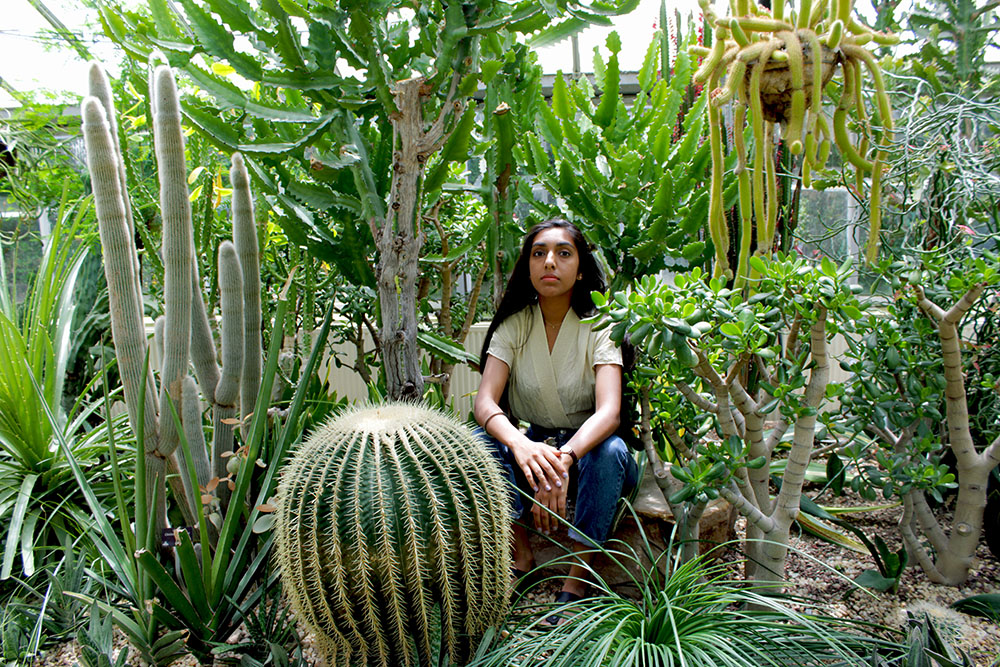
Photography by Jake Pitre
We all want to be noticed. We want to create and share, and receive recognition for our creations, if we can. When Rupi Kaur uploaded a picture on Instagram in January depicting a woman lying in bed with blood staining her pants, it didn’t seem likely that it would become the moment when the whole world noticed her. When the whole world would choose whether to praise her work, or beat her down and shame her for it.
“I don’t care anymore what people think,” she tells me now, months later. “I feel so much more confident. People are either going to romanticize you or dehumanize you, but I’m going to create the work I want to create and you can look or not.”
The picture went viral, seen millions of times across social media and on the news, discussed ad nauseum by talking heads and online commenters. What was meant not so much to offend as to normalize had the unintended consequence of making Rupi Kaur a household name for a couple of weeks, by infuriating some and empowering others. It was a decidedly modern phenomenon, and one that Kaur has been confronting since.
Kaur, 22, hasn’t been sitting idle since her brush with mainstream fame — she’s simply collecting ideas and waiting until they take the right form to let them go at the right time. Meanwhile, she is still dealing with the aftermath of that photo, which means, in part, taking time and effort to heal. “The work that I create sometimes demands attention,” she says, “but I want it for the work and not for myself, and suddenly it was directed at me and I didn’t know what to do or how to handle that.” At first, she went into what she calls a numb state, answering media inquiries out of some sense of duty to defending her work but otherwise shutting down. She says the increased attention on her was scary, partly because there would now be so much expectation on her, so much pressure to say the right thing and follow up with something even more impressive.

She was also contending with the phenomenon of being censored for something that is so natural in life, and facing the fact that her artistic expression of that had been taken away from her in a way that was completely out of her control. “It makes you feel like when you’re a kid and you’re trying to explain something to your parents and they keep shutting you down and you’re completely voiceless,” she says of the experience. Within 24 hours, enough people had reported the photo that Instagram took it down. Kaur uploaded it again, and they took it down once more. Then the backlash to the decision began, and her photo re-appeared.
“When it benefitted them to remove the photos, they did, but when it was bad for their PR, they put it back up,” she explains. “I didn’t understand the impact it would have. I just wanted to see the different ways the people that followed me would interact with it. Then I just became scared that everyone would hate me.” But there was a silver lining to the media blitz and Instagram’s actions. “They legitimized my entire project,” she says. It brought about plenty of nastiness, but it also started countless conversations about women’s bodies and how they are perceived, as well as censorship and social media. Her favourite moment was when she found the photos had been placed back, because how often do you win against a corporation that size? We so often think of our social media accounts as our personal spaces that belong to us, covered in our faces from all our selfies and run by us and us alone, but the reality is that we do not own any of this content and we do not control it. Kaur’s picture did change Instagram’s policy terms about what kinds of photos are allowed, however, so change is possible. Plus, she says, “my skin is so thick now, so that’s a nice feeling.”
“At the end of the day, I want to sit on the table with Pulitzer Prize winners and have conversations with them.”
Kaur grew up in Punjab, India, but moved to Canada when she was old enough to have both environments become part of who she is, and now lives in Toronto. Though she says she has sometimes felt forced into the world of her parents, it certainly helps to define her first generation experience in the Western world. This manifests itself in her work, in her poetry, as she touches on issues that seem Western from a minority’s perspective, lending it a specificity that can be felt by all. “When I first started to write, I thought I should write love poems,” she says. “I wasn’t able to, and I was so upset with myself. I was just writing about my people. When you’re a first generation immigrant, the idea of home is so complicated to you. Home isn’t here, because people look at you like you’re from somewhere else, but you go back and they do the same thing. So where is home?” Her reaction was to use her art to figure that out, before she could even try to express anything else artistically. “I’ve found a comfortability in my own skin, so I’ve started writing about other experiences,” she says.

She’s not resentful about getting so much attention for a photograph instead of her poetry, instead choosing to focus on how it brought so much more attention to her writing, including sales for her debut collection, Milk and Honey. “People take me more seriously now. But at the end of the day, I want to sit on the table with Pulitzer Prize winners and have conversations with them,” she says, her unabashed ambition making her excited. “Sometimes people make you feel like you can’t, because all you are is an Instagram poet, whatever that means. But just because I’ve taken an unconventional route doesn’t make me and my work any less valid.”
Indeed, a common criticism of the millennial generation is our invariable vapid self-absorption, our obsession with social media and making sure we always present the best version of ourselves, and that we do so consistently. “That’s my greatest fear,” Kaur says. “Getting trapped in constantly putting content out there so that it just becomes diluted. A lot of women, a lot of women of colour, a lot of women in my community do not get this stage that I have been given, so I want to use it as a blessing if I can and take my time. How do I use this to my advantage? How do I spread this love?” Social media is a form of vulnerable performance, and Kaur has embraced her designation as an “Instagram poet” as something that allows her to express herself more honestly than she otherwise could. Read some of her responses to questions she receives on her Tumblr and you can see how long she pores over them, thinking carefully about what to say and exercising more empathy in one response than most of us do all day. Her poetry is often simple and direct, incredibly personal but written in such a way that makes the feelings and the pain and the joy universal.
“The sense of voicelessness is very familiar to me,” she says. “In elementary school, I didn’t speak, people thought that I was mute. Writing was very much my way of being like ‘fuck you’ to the world. The number one goal will always be to find the words that satisfy me, because I know that when I start doing this for other people, that’s when I start to slip into depression.” That may be more of that millennial self-absorption, or it may be an honest account of the significance of expression and the cost of when it is not under your control and subject to ignorance. “It’s about allowing people to feel what they’re going to feel and knowing that you’re never going to please everyone so deal with the consequences and find what you can change.” Advice worth taking.







